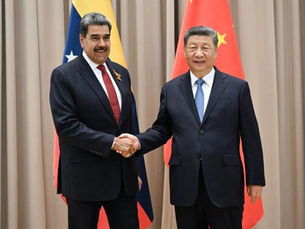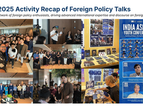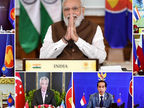top of page
Our Research and Publications


Indonesia’s G20 Tightrope: Embracing 2026 US Chairmanship of the G20
Recent U.S. actions, such as intervention in Venezuela, measures targeting Iran, and withdrawal from dozens of multilateral institutions, have drawn global attention and led many countries to anticipate broader shifts in U.S. foreign policy, including how Washington may exercise leadership during its 2026 G20 Chairmanship. After the anti-climax closure of the South African Chairmanship of the G20 last November, multilateral economic diplomacy will see a new dawn in the chairm
Karlina Aucia Agusta and Lusia Novita Sari


Why Indonesia Needs a Global Economic Forum of Its Own
This article is inspired by two recurring reflections that continue to raise a fundamental question for me: why has Indonesia despite its size, influence, and potential long lacked a strong and consistent global narrative?
Noto Suoneto


Venezuela: America’s Ukraine
In the early morning of 3rd January, 2026, the United States launched a dramatic military operation in Venezuela and captured president Maduro along with his wife and flew to the United States to face criminal charges. In addition to announcing the strike, US President Donald Trump declared that the United States would temporarily govern Venezuela during the transition period.In the western hemisphere, this unparalleled sudden attack has caused tremors among the countries. Th
Rajarshi Chakraborty


From the Caribbean to the Amazon: China's crude-centered pivot away from Venezuelan to Brazilian Oil
In early January, the Venezuelan President Nicolas Maduro was captured in a special military operation in Caracas, and is expected to be tried for drug trafficking in New York. This represents the natural conclusion to a doctrine of maximum pressure against the Venezuelan Regime, which has been formally accused of fomenting drug trafficking operations across the Americas. The Maduro Regime has also been deemed as illegitimate by multiple sectors of the international community
Carlos Ricaurte-Orozco


Indonesia’s Arms Diversification is inevitable, but the Approach Must Prudent
Indonesia arms modernization has proven to be one of president’s primary priority programs. The president’s Asta Cita program has called for strengthening the national defense system and empowering the country’s autonomy as one concerted effort. Arms modernization program fall under Optimum Essential Forces (OEF), the continuation of previous long-term military modernization called Minimum Essential Programs (MEF).
Sandy J. Pratama


The Key Foreign Policy Players of Prabowo’s Presidency
Four years ago, in The Diplomat, one of the world’s most prominent international outlets for foreign policy observers, I wrote about how Prabowo Subianto, then serving as President Joko Widodo’s defense minister, helped shape Indonesia’s foreign policy. I argued that alongside figures such as Retno Marsudi and Luhut Binsar Pandjaitan, Prabowo played an increasingly influential role, particularly through defense diplomacy and the diversification of Indonesia’s security partner
Noto Suoneto


What did China gain from the recent G20 Summit in Johannesburg?
Chinese Premier Li Qiang addresses the third session of the 20th G20 Summit in Johannesburg, South Africa, Nov. 23, 2025. (Photo: Huang Jingwen/Xinhua) What's happening in Johannesburg? On 22nd November, G20 Leaders adopted a declaration in Johannesburg Summit 2025 against the backdrop of quite a turbulent geopolitical quagmire. The United States, being the next country to lead the presidency boycotted the meeting, with the Trump Administration citing “persecution of white
Upamanyu Basu


Broker, Not Architect: Malaysia’s Quiet Pragmatism Meets Its Limits in the Cambodia–Thailand Conflict.
Malaysian Prime Minister Anwar Ibrahim with Cambodian Prime Minister Hun Manet and Thai Prime Minister Anutin Charnvirakul as they shake hands during the ASEAN Summit in Kuala Lumpur, Malaysia, 2025. By the time ASEAN, along with its leaders, gathered in Kuala Lumpur in October 2025, things were decidedly optimistic. Just in their capacity as the chair of ASEAN, Malaysia had assisted in the Kuala Lumpur Peace Accord between Cambodia and Thailand after months of worsening bord
Gareth Liu Zi Yuan


China’s Oil Hunger Fuels Venezuela’s Crypto Shift
Chinese President Xi Jinping meets with Venezuelan President Nicolas Maduro in Moscow on the sidelines of the celebration marking the 80th anniversary of the victory in the Soviet Union’s Great Patriotic War in May 2025. In Late November , President Trump has announced Venezuela contain a no-fly zone, further growing tensions between the U.S. and Maduro regime. Since September , the U.S has launched 21 strikes against suspected drug vessels, killing 83 people, also amassing m
Martin Brown and Carlos Ricaurte-Orozco


Why China’s Attitude Toward the Global Order Matters More Than Its Power
Waving mini Chinese flags, people crowd Tian'anmen Square in Beijing to watch the flag-raising ceremony on Oct 1, 2020. China’s reemergence as a global power dominates debates about the future of the international order. As China rises, power alone does not dictate how a rising state interacts with the global system.What matters more for the United States and its allies is China’s attitude toward the rules, norms, and institutions that structure international order. Whether B
Suloja Khadka


Australia’s Cultural Blind Spot is its Most Important Neighbor
Anthony Albanese poses with Bluey and Bingo from the hit ABC TV show Bluey. Indonesia’s 280 million people makes it one of the most populous countries in the world. With a median age of roughly 30, it is a nation driven by youth, digital fluency, and a rapid appetite for global cultural products. Korean pop music dominates its TikTok feeds and concert venues, Japanese anime and games shape entire subcultures, and its parents name their children after European soccer stars. Y
Michael Tomasoa and Weilie Winaldy Sugianlie


Will the United States Alter Saudi Vision 2030?
U.S. President Donald Trump and Saudi Crown Prince Mohammed Bin Salman meet in Riyadh, Saudi Arabia, May 13, 2025. The 2030 Saudi programme represents an ambitious goal established by the Saudi Arabian government in 2014. This goal encompasses domestic modernization and Saudi Arabia’s focus on regional security and economic stability, particularly in the Middle East and the Gulf. Saudi Arabia's efforts align with Buzan and Weaver's regional security complex theory, as the Mid
Alwi Akbar


Territory Without Borders
Most people don’t realise it, but our daily digital habits now sit inside foreign political systems. We are used to thinking of territory as physical (land, borders, airspace, and seas), a space we inhabit. That how we usually define territory in law & politics, but the concept does not always fit neatly within media studies. In digital age, media territory destabilises traditional assumptions about where politics “happens.” States no longer need to occupy land to influence p
Lupita Wijaya


Navigating ASEAN Centrality in the Shadow of Philippine Geopolitical Dualism
President Ferdinand 'Bongbong' Marcos Jr. lead the official launch of the Philippines’ Chairship of the Association of Southeast Asian Nations (ASEAN) 2026 at the Foro de Intramuros in Manila on 14 November 2025. When the Philippines assumes the Chair of the Association of Southeast Asian Nations (ASEAN) in 2026, it will do so at a pivotal and precarious moment for the region. The Chairmanship, themed “Navigating our Future, Together,” comes not only amid deepening geopolitic
Christopher Paller Gerale


The EV Market Beijing Already Won
The Beijing Auto Show 2025 hall is packed as visitors explore XPeng and Lynk & Co cars on display alongside other. On October 22 nd , 2025, Tesla reported a 37 percent profit drop in their third fiscal quarter of 2025. However, revenue rose 12 percent , currently valuing Tesla at $28.1 billion. However , Tesla sold more cars from July through September than it did in the same time frame in 2024. Yet, Tesla earned less due to exorbitant price cuts and low-interest loans. How
Martin Brown


From Lombok to Sydney: A New Era for Indonesia–Australia Relations?
Indonesia’s President Prabowo Subianto and Australian Prime Minister Anthony Albanese aboard HMAS Canberra at Garden Island Naval Base in Sydney, where they announced a new security agreement on 12 November 2025. When Indonesian President Prabowo Subianto arrived in Sydney this week, the symbolism was unmistakable. His early visit just months after taking office underscored Jakarta’s view of Canberra as a key partner in an increasingly uncertain Indo-Pacific. The highlight
Noto Suoneto & Genevieve Donnellon-May


How Prabowo’s Realpolitik Redefines Indonesia’s Foreign Policy
President Prabowo Subianto, flanked by Foreign Minister Sugiono and Cabinet Secretary Teddy Indra Wijaya, takes part in the APEC 2025 Economic Leaders Meeting in Gyeongju, 31 October 2025. “Amid global uncertainty, Prabowo’s assertive diplomacy signals Indonesia’s shift from moral idealism to pragmatic realism.” Reflecting on Prabowo’s first year of administration, Indonesia has taken a pivotal shift in foreign policy. After nearly a decade of restrained diplomacy, the public
Pancar Cahaya Tajally


Indonesia’s Bridge-Building Ambition: Global Aspirations Rest on Regional
President Prabowo Subianto walks into the APEC 2025 summit venue in Gyeongju, South Korea, on 31 October 2025, accompanied by Coordinating Minister for Economic Affairs Airlangga Hartarto, Foreign Minister Sugiono, Cabinet Secretary Teddy Indra Wijaya, and other delegates. Indonesia’s president’s intention in the Gaza issue and its role as an intermediary in the future peace efforts in the region post-Gaza summit marks an important step in projecting Indonesia's role as a gl
Kenzo Baskoro


Navigating the Indo-Pacific Question: Potentials For QUAD-ASEAN Alignment
Australia’s prime minister Anthony Albanese, India’s prime minister Narendra Modi, US president Joe Biden and Japan’s prime minister Fumio Kishida at the Quad leaders summit in Claymont, Delaware, on 21 September 2024. Security and strategy have been the guiding principles in today’s geopolitical scenario. The ASEAN, or Association of Southeast Asian Nations, has been at the forefront of ensuring a secure and stable world. At the core of it lies a critical region, the Indo-Pa
Anshika Malik & Siti Zulaikha


Reforming Indonesia’s Diplomatic Machine in a Time of Global Uncertainty
Reform within Indonesia’s diplomatic machinery has become increasingly urgent. The global landscape both political and economic is undergoing rapid and profound transformation. Traditional alliances are being redefined, new blocs are emerging, and the once-stable rules of global trade are now in flux. Former U.S. President Donald Trump’s return to prominence has once again disrupted the foundations of multilateralism, while protectionist tendencies and great-power rivalries f
Noto Suoneto
bottom of page








































